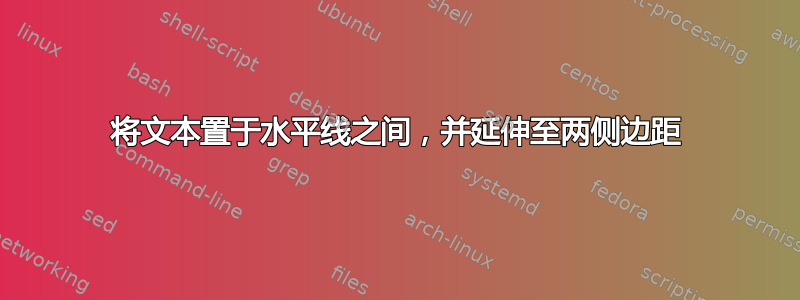
我想知道如何制作这样的事情:
---------------------------------- Text -------------------------------------
用文字来说:文本居中。行与文本之间留有一定空间。行与文本中心垂直对齐,并延伸至两侧的边距,因此总长度为\textwidth。思路如下:
\documentclass{article}
\begin{document}
\centering{\rule[0.5ex]{4.5cm}{2pt} \hspace{0.6cm} Text \hspace{0.6cm} \rule[0.5ex]{4.5cm}{2pt}}
\end{document}
编辑:应该改变的是线的长度,而不是空间的长度。
答案1
可扩展规则和可定制高度:
\documentclass[a4paper]{article}
\usepackage[T1]{fontenc}
\usepackage{lipsum}
\makeatletter
\newcommand*\variableheghtrulefill[1][.4\p@]{%
\leavevmode
\leaders \hrule \@height #1\relax \hfill
\null
}
\makeatother
\begin{document}
\lipsum[1]
\noindent
\variableheghtrulefill[.5ex]\quad Text\quad\variableheghtrulefill[.5ex]
\lipsum[2]
\noindent
\variableheghtrulefill[.5ex]\quad Wider text\quad\variableheghtrulefill[.5ex]
\lipsum[3]
\noindent
\variableheghtrulefill\quad
No argument gives default height\quad\variableheghtrulefill
\lipsum[4]
\end{document}
编辑: 这是产生的输出:

编辑2: 抱歉,我完全忽略了有关规则垂直对齐的要求;作为一种过度补偿,以下代码试图彻底解决这个问题:
\documentclass[a4paper]{article}
\usepackage[T1]{fontenc}
\usepackage{lipsum}
\makeatletter
% User command: \genhrulefill
% This time we make it full-fledged! (:-)
%
% SYNOPSIS
% - \genhrulefill[<base_height>][<thickness>]
% A rule of thickness <thickness> whose lower edge runs
% at a height of <base_height> above the baseline of the text.
% - \genhrulefill[<base_height>]
% A rule of default thickness (0.4pt) whose lower edge runs
% at a height of <base_height> above the baseline of the text.
% - \genhrulefill
% A rule of default thickness (0.4pt) whose lower edge runs
% along the baseline of the text.
% - \genhrulefill*[<thickness>]
% A rule of thickness <thickness> whose axis is aligned along
% the math axis.
% - \genhrulefill*
% A rule of default thickness (0.4pt) whose axis is aligned along
% the math axis.
\newcommand*\genhrulefill{%
\begingroup % paranoid -- it's because we use \@tempdima, etc.
\@ifstar \@s@genhrulefill \@n@genhrulefill
}
\newcommand*\@n@genhrulefill[1][\z@]{%
\setlength\@tempdimb{#1}%
\@x@genhrulefill
}
\newcommand*\@x@genhrulefill[1][.4\p@]{%
\@tempdima \@tempdimb
\addtolength\@tempdima{#1}%
\@genhrulefill
}
\newcommand*\@s@genhrulefill[1][.4\p@]{%
\setbox\z@ \hbox{$\global \dimen@i \fontdimen22\textfont\tw@$}%
\setlength\@tempdima{#1}%
\@tempdimb \dimexpr \dimen@i-\@tempdima/\tw@
\advance \@tempdima \@tempdimb
\@genhrulefill
}
\newcommand*\@genhrulefill{%
\leavevmode
\leaders \hrule \@height \@tempdima \@depth -\@tempdimb \hfill
\null
\endgroup
}
\makeatother
\begin{document}
\lipsum[2]
\noindent
\genhrulefill[.5ex][4pt]\quad
All arguments are given\quad\genhrulefill[.5ex][4pt]
\lipsum[2]
\noindent
\genhrulefill[.5ex]\quad Default thickness\quad\genhrulefill[.5ex]
\lipsum[2]
\noindent
\genhrulefill\quad No arguments\quad\genhrulefill
\lipsum[2]
\noindent
\genhrulefill*[2pt]\quad $*$-form, explicit thickness\quad\genhrulefill*[2pt]
\lipsum[2]
\noindent
\genhrulefill*\quad $*$-form, default thickness\quad\genhrulefill*
\lipsum[2]
\end{document}
我认为命令的星号形式\genhrulefill应该是首选形式。
输出:

答案2
它具有可调节的厚度,并且垂直对齐规则,仅考虑文本中的上升部(而不是下降部,因为就阅读而言,它们在视觉上无关紧要)。
\documentclass{article}
\usepackage{lipsum}
\newcommand{\textbetweenrules}[2][.4pt]{%
\par\vspace{\topsep}
\noindent\makebox[\textwidth]{%
\sbox0{#2}%
\dimen0=.5\dimexpr\ht0+#1\relax
\dimen2=-.5\dimexpr\ht0-#1\relax
\leaders\hrule height \dimen0 depth \dimen2\hfill
\quad #2\quad
\leaders\hrule height \dimen0 depth \dimen2\hfill
}\par\nopagebreak\vspace{\topsep}
}
\begin{document}
\lipsum[2]
\textbetweenrules{Text}
\lipsum[3]
\textbetweenrules[3pt]{\Large aapaa}
\lipsum[3]
\end{document}
调整间距。这样就不会允许在有规则的文本后出现分页符。

答案3
\documentclass{article}
\usepackage{lipsum}
\begin{document}
\noindent\lipsum[1]
\noindent\rule[0.5ex]{4.5cm}{2pt}\hfill{}Text\hfill \rule[0.5ex]{4.5cm}{2pt}
% fixed space around, but the width and depth of rule is not changeable
\noindent\hrulefill\hspace{.6cm}Text\hspace{.6cm}\hrulefill
\end{document}



